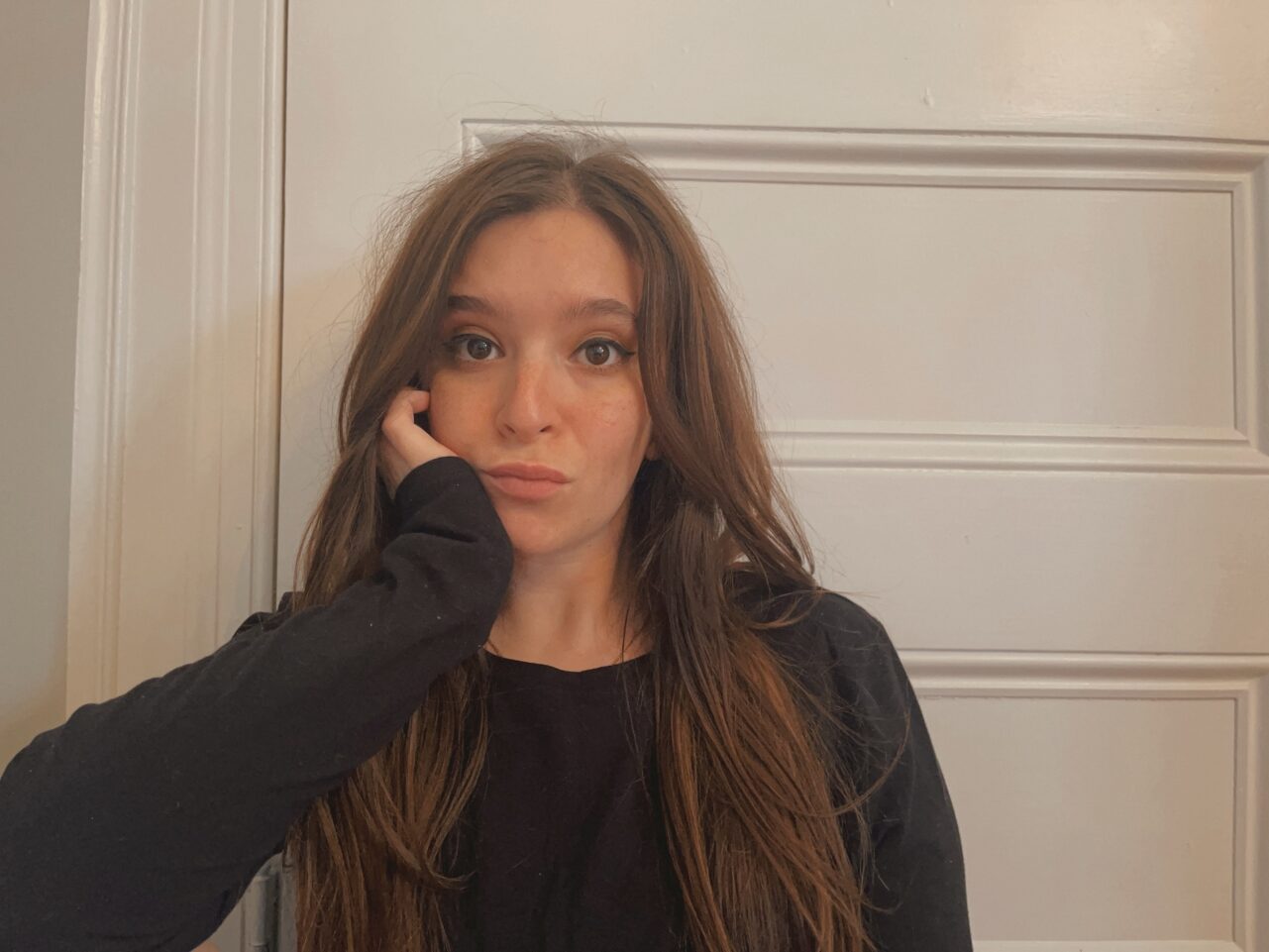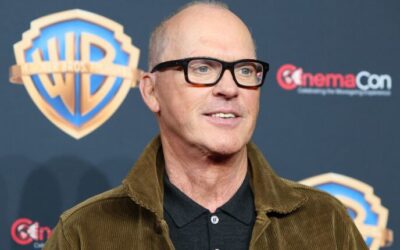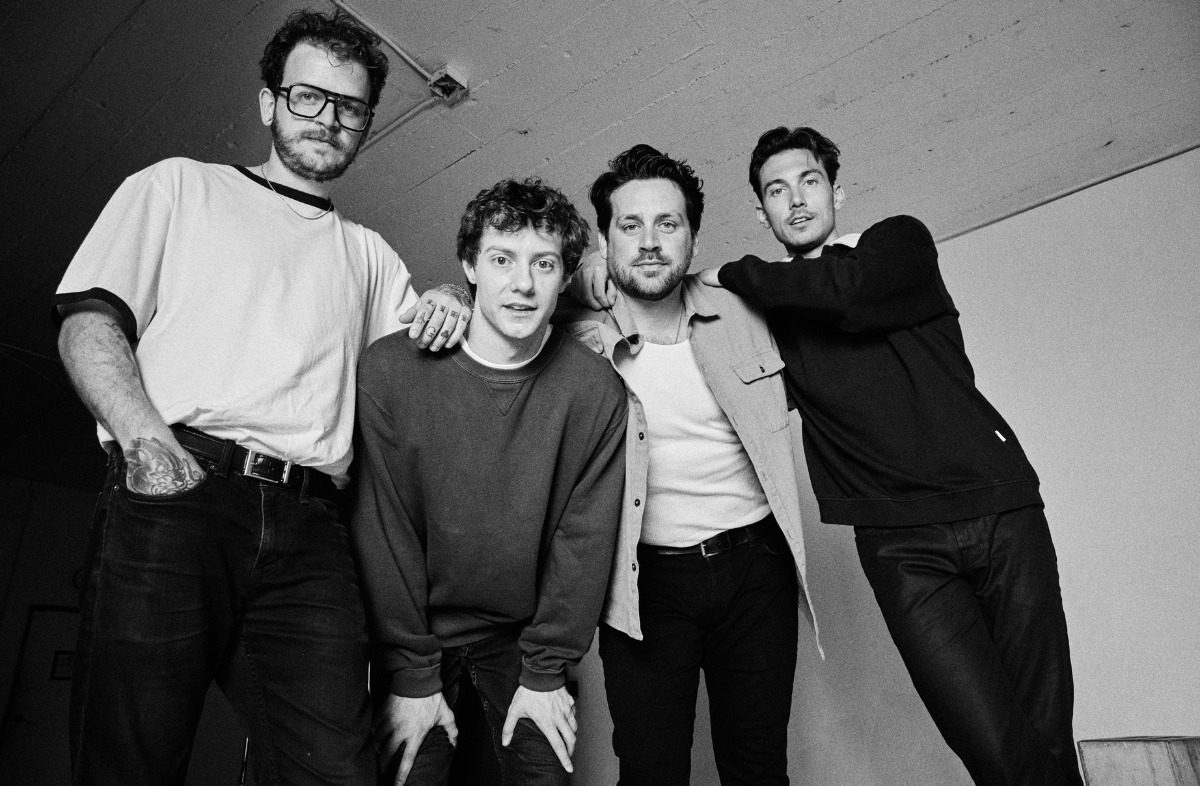
Black and white photo of the band Grayscale. (Photo courtesy of Keenan Reed).
Music, more than anything, serves as my primary connection to the world around me. Whenever I want to feel seen, or understood, or less alone, I turn to carefully arranged playlists to help me through. I have a collection of songs I cycle through for almost every emotion I experience, and it is through these collections that I find my way back to myself during moments when I feel truly lost.
Most recently, those playlists have consisted of songs by the Philadelphia rock band Grayscale. The band’s newest album, “The Hart,” was released on Jan. 31, and the record is filled with songs that capture a range of complicated emotions. Speaking with lead singer Collin Walsh, it became clear that he, along with the other members of the band — Andrew Kyne, Nick Veno, and Dallas Molster — were using this album to collectively process difficult experiences they’ve had over the last few years.
Walsh spoke candidly about what it’s like to work with someone through their addiction, and how that was something that felt like a fixture in his Philly upbringing. I’m from Boston, but it’s something I’ve experienced as well. We took a moment to recognize that there are specific things about being from the Northeast that other people may not understand, and to express appreciation for being lucky enough to be on the other side of those experiences now.
Talking to him about how much he loves his hometown — the culture of Philadelphia, the sports teams, the food, and the local venues — also made me feel seen, and understood, and less alone, even though I’m not from there. Grayscale has a lot of Philly pride, and they’re thankful for the ways the city has shaped them, which is how I feel about being from Boston. It served as a nice reminder that we have more in common than we think we do. Sometimes we just need a good 39-minute album (or a 30-minute conversation) to remind us of that.
In addition to talking about some of Walsh’s favorite Philly establishments and which local venue Grayscale would love to play one day, we also discussed the serendipity of his band being inspired by a band I grew up with, the importance of speaking openly about sensitive topics, and much more.
Sam Cohen/Keystone: I usually like to start my interviews with more of a ‘getting to know you’ type of question, so, what is your earliest memory of joy in relation to music?
Collin Walsh: That’s such a good question. When I was a kid, I remember being in a car seat and my dad playing Third Eye Blind’s self-titled record. My dad collected the jeweled CD cases, but I don’t know if he actually had a physical album, or if it was just on the radio. It was probably a combination of both. But I remember listening to Third Eye Blind with my dad when I was a kid, so that was one of the earliest ones, for sure.
SC: One of the things I love about Grayscale is how much pride you have in where you’re from. How did growing up in Philly inspire or influence you as a musician? Did it have a direct impact on how you approach your career or how you sound stylistically?
CW: That’s another great question. [Both laugh]. I think it 100% shaped who I am and who we are as a collective unit. On this record, “The Hart,” more than any other record, that’s intentionally portrayed. Philly is such a musical, artistic city. There’s so much history to it and so many different kinds of art here. As far as music specifically, there’s Hall & Oates, there’s The Roots, there are some incredible artists from here. We’re really proud to be from Philly. This city has this little brother syndrome to New York. We’re just like diehard fans of our sports, food, and the culture here. We’re really proud to represent the city. It’s shaped so much of our stories and our songwriting through that.
SC: That must be nice to grow up in that kind of atmosphere. I grew up right outside of Boston, and we were big into basement shows and church shows. I don’t know if you remember the band Transit? But I grew up with a few of the guys from Transit, so that type of music scene was really impactful in my hometown.
CW: Transit was one of the biggest influences of our early Grayscale stuff. Our first EP, “What We’re Missing,” we did it ourselves. This was before we were on a label or anything, and we did it with Gary Cioffi, who Transit did most of their records with. Grayscale literally recorded our first EP in Danvers, Massachusetts with Gary, because Gary’s brother, Torre, was in Transit. They’re a huge influence for us. PJ, the bassist of the band, co-engineered that EP. I love that band, we’ve always loved that band. Transit’s guitar work was always something that was really inspiring to us, and the way they nurtured where they were from and put that in their music, and made it heard in their music. That was a huge influence on Grayscale early on.
SC: That’s really funny because I didn’t know you guys had been influenced by Transit. That just made my whole day. I grew up with their drummer Daniel Frazier, and their original guitarist Joe Lacy, and Tim Landers.
CW: I didn’t know them well. When we were doing that EP, I remember some of them coming into the studio and listening to mixes, and I remember being like, ‘We love you, that’s why we’re here.’ I met Tim very briefly. I didn’t meet Daniel at the time, but PJ and Ella, their singer, I knew the most. Ella sat in and we had conversations about singing and I picked their brain about being a vocalist. And we had no money for a hotel or anything, so we slept in the studio upstairs, and I remember we were in Danvers in the winter and it was freezing. There was one night where my sleeping bag wasn’t enough, so I made a fort out of Transit merch to keep myself warm. [Both laugh]. So yes, I’m very familiar with Transit.
SC: I love that. That makes me so happy. To build off what you were saying about growing up in Philly, what are some of your favorite local places that remind you most of your upbringing?
CW: The Reading Terminal Market. It’s right between the convention center and Chinatown. I have a lot of good memories going there before or after sports games and eating my face off with my dad, while I learned about different kinds of food and cultures. And then going to Phillies’ games as a kid in the summer. I feel like a lot of my memories as a kid are from the summertime for some reason.

Black and white photo of the band Grayscale. (Photo courtesy of Keenan Reed).
SC: To shift into something a bit more serious, you’ve spoken very openly about the experiences you had that inspired the lyrics on “The Hart.” A lot of them touch on difficult topics like loss, grief, and addiction. How do you think talking about these experiences more candidly than previous generations have is going to resonate with your fan base? Or even with the people in your inner circle?
CW: When I look at the artists I really love, like Bruce Springsteen, Tom Petty, Sam Fender, I really love how they tell stories. There are colorful lines and there’s an interesting poetry to them and how they’re very deliberate about their storytelling. Those artists, to me, do it better than anyone. With this record specifically, there was a lot that I really wanted to get out. That approach of leaning into that is really hard, but it was important. Not only did I have things I wanted to say, but the way I wanted to say them, I wanted to be very deliberate and forthright about it. Third Eye Blind is another one — the lyricism is incredible. Those are artists I take a lot of inspiration from. There’s certain things that are uncomfortable to really go deeply into, but that’s what Bruce Springsteen would do. That’s what Stephan Jenkins would do. They wouldn’t hesitate to be open.
SC: Totally. From a personal perspective, it’s been cathartic for me when I’ve been listening to it. Addiction and alcoholism have colored many different areas of my life. Your approach is refreshing because you’re examining it from a place of empathy and understanding, which I think is important when you talk about addiction. That helps remove some of the negative stigma around it, and the guilt people feel when they want to enter recovery and can’t, or you’re trying to support someone who’s trying to enter recovery.
CW: Thank you. I don’t know if it’s a Northeast thing, but there’s something about Boston, where you’re from, and Philly, where I just feel like everyone I grew up with got into drugs very young. I was surrounded by that with some of the people I grew up with, and friends of friends, and with my family, very early on in life. And it’s been hard trying to figure out how to navigate those situations interpersonally. When it comes to addiction, if you know someone who’s been in the throes of it, there is this childish thought process to it that can be frustrating, and if you’re in that long enough, whether you’re helping someone or you’re going through it yourself, there is this empathy that appears. Sometimes it doesn’t happen until you’re on the other side of it, or when you look back at it, but you eventually learn the lesson of, “There’s nothing I can do to help this person. All I can do is be present. That’s all I can offer is my presence for this person.” No matter how close you are with them, you can’t convince them to do something they’re not willing to do themselves.
There’s something humbling in learning that lesson, but there’s pain there, too. Hopefully, if that person gets to a better place, it can be a good feeling knowing that you had that presence [in their lives] all along, no matter how bad it was, no matter how helpless and hopeless it felt. Once it starts to get better, all you can do is be a pillar for them—to just be something that exists and is there no matter how good or bad it gets. The life lessons that come in that, so much of those lessons are sprinkled throughout the songs on “That Hart” that dip into that subject matter.
SC: I think that’s really well said, and it’s a good lesson to learn, but it’s a hard lesson to learn. You can’t want it for them. They have to want it for themselves. All you can do is be supportive and show up and approach it from a place that’s free from judgment. I appreciated all of that when I was listening to “The Hart.” That was my experience as well — I’ve known people who have overdosed, and I also find it helpful to write through it because I find it easier to figure out how I feel about something once I write about it. I have a hard time physically articulating it.
CW: Yeah, 100% for me too. I mean, that’s why I started writing lyrics to begin with was that exact thing. I connect better when I lay it down and write it versus trying to tell someone how I feel.
SC: Oftentimes in these kinds of interviews, musicians are asked what was challenging about the writing and recording process, but I’d like to flip that and examine it from a different angle. What was the most rewarding thing about writing and recording “The Hart?”
CW: I think, coincidentally, the things that were the most challenging for us with this album were also the most rewarding. We eliminated a lot of the fancy gear and tools that we had before, and we spent so much time just writing this record with amps in a room, like a rock band, like we did when we were kids, you know? Before we had any gear, when it was like four or five guys with shitty amps in a room and that was it, and that was all that mattered. Coming back to writing records that way after you’ve been doing this for six, seven years or whatever it is, and you get bigger budgets and nicer studios and resources to make records, it really forces you to focus on the individual parts and performances. We spent so much less time on the computer this time around and spent more time playing live in a room, and doing takes and practicing and getting the actual performance right. When you’re not polishing and layering things a million times, you have to focus on the intimacy of the vocal take and whether it portrays the emotion you want it to portray.
There’s less room to hide when there’s less to make it sound squeaky clean. And songs like “Not Afraid to Die,” which was the first song we wrote for this record, everything you hear on the released version that’s on Spotify are the instrumentals and vocals we played and recorded, at the same time, while we were all in one room together. So, approaching everything that way, and having that spirit to this record, all of that was really challenging but so rewarding. Because that’s purely what our band sounds like.
SC: You played two events in Philly on Friday to celebrate “The Hart” coming out, and you’ve also been doing a holiday show there the last few years. What do you love most about the experience of being able to celebrate these milestones and moments with the people in your hometown?
CW: Someone asked something similar at one of those events we did on record release day, about how it feels to go from some of those basement shows we talked about, and playing near Drexel’s campus, to what we’re doing now. I remember with a lot of them, the ceilings were so low, and the staircases were so narrow, we’d have to take part of the kick drum off and then put it back together in the basement because it wouldn’t fit down the stairs. Going from playing in bars and churches and celebrating these milestones, all the way up to playing at the TLA (Theatre of the Living Arts) and the Fillmore, it’s everything we’ve ever wanted. We’re very happy about, and proud of, the hard work we put in. It’s been a really cool journey. The spirit and how much support we get at home is amazing, and we will always, always be thankful for it. There are still people who come to our shows at the TLA, and the Fillmore, who were at those shows in basements when there were only five people there. That’s an amazing feeling.

Black and white photo of the band Grayscale. (Photo courtesy of Keenan Reed).
SC: Do you have any favorite Philly venues you like to perform at, or haven’t performed at yet but would like to one day?
CW: I love the TLA. I love that venue so much. I love the Church (First Unitarian Church of Philadelphia). It’s this church basement that has a carpeted stage, and there’s so much history to it. It’s just this really cool, cult thing of having this church that has this punk rock basement, and I’ve always loved playing there. In terms of places we haven’t played yet, we played the side stage at the Mann Center before, but there’s an amphitheater stage we haven’t done, and I would love to do that one.
SC: What would you want to include in a “things you didn’t know about Grayscale” story?
CW: We’ve known each other since we were 14 years old. We still all live in and around the same area. We’re all best friends, but Nick [Veno], our drummer and I are really close. Nick and I actually met on Craigslist back in the day. [Both laugh]. Which is insane. I posted a “looking for a drummer” type thing, and Nick answered it and came to my house when we were teenagers. And since then, we’ve fallen in love and we’ve been best friends ever since. Andrew [Kyne], our guitarist, he’s a huge video game guy. I think the fans are afraid to talk to Dallas [Molster]. He’s not very talkative, but he’s actually a huge teddy bear. He’s into music and tattoos and going to the mountains and doing manly shit. [Both laugh]. Nick and I love sports as much as we love music. He loves baseball and I love football. I played a ton of football as a kid and my dad was a coach for many years for my brother and I. Everyone in the band were athletes when we were younger. I’m sure there’s way more stupid stuff I could go into, but we’ll go with that for now.
SC: Speaking of football, I’m sure you’re excited about the Eagles being in the Super Bowl.
CW: Oh yeah, I can’t wait. I really hope we win. I really don’t like the Kansas City Chiefs [laughs].
SC: We’ll speak that into the universe — the Eagles winning the Super Bowl, and also you playing the venues you want to play. I’m a big proponent of that.
CW: I love that so much.
SC: I usually like to end my interviews with a fun question, so, which song on the album would the childhood version of yourself be the most proud of, or the most surprised by?
CW: That’s sick. That’s a great question. I think the song “Through The Landslide,” which was the focus track on “The Hart” for the record release. It’s everything I love about music, and I think we executed it really well. The inspiration for that one is basically our love of ‘80s music and those big synth hits with gritty guitars and big choruses with fast energy, but with lyrics that are more intimate. I think the younger version of me would be really proud of that song.
Grayscale will be playing with Mayday Parade on May 31 at the Fillmore.
“The Hart” is available now on all streaming platforms. You can connect with Grayscale on: Instagram, TikTok, YouTube, X,Spotify, and Facebook.
READ MORE: 11 must-try pizza places in Philadelphia
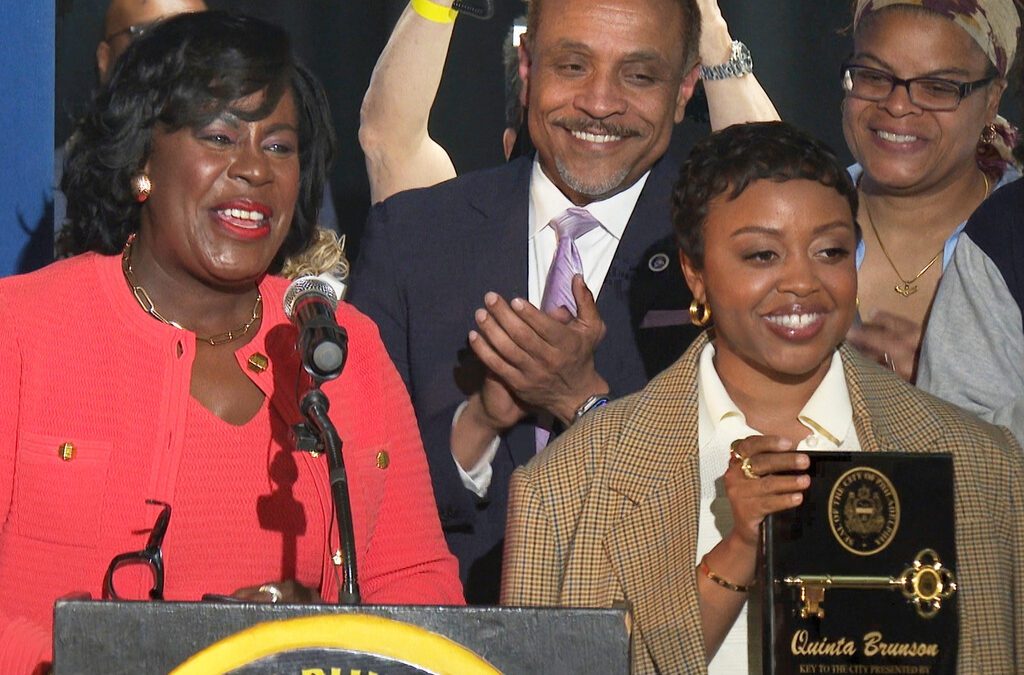
Philadelphia honors Quinta Brunson with key, mural at alma mater that inspired ‘Abbott Elementary’
Philadelphia’s mayor honored actor and producer Quinta Brunson with a key to the city Wednesday in a ceremony dedicating a separate mural at...

At 84, his ‘Taps’ salute is ‘final goodbye’ at Washington Crossing National Cemetery
The first veteran to be buried on a cloudless day at Washington Crossing National Cemetery was Alan Clark. Jim McDevitt, 84, in uniform, readied his...

Yo, Lois! The new Superman is from Philly
Philadelphia native David Corenswet honed his acting chops performing in local stage productions as a youth. This summer, he’ll appear on the big...

In Walworth County, neighbors rallied for rides—and rediscovered what it means to be a community
When I was a new mom, I wanted nothing more than to move out into the countryside with my baby. I had been raised in mostly rural places and have...
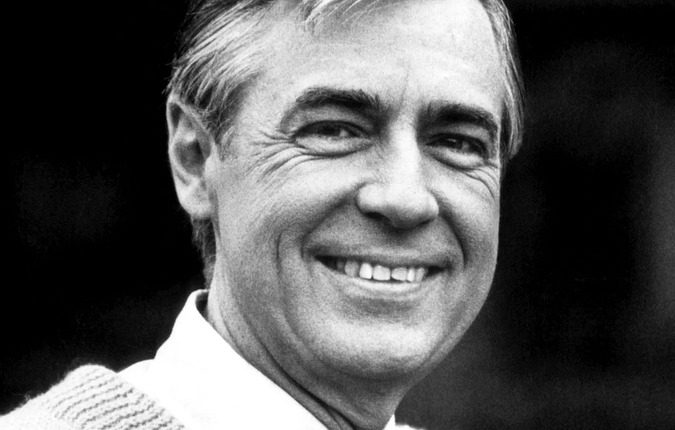
6 facts about Mister Rogers
It’s a beautiful day to learn more about everyone’s favorite neighbor (and Pennsylvania's claim to fame). Here are six stories and facts about...

